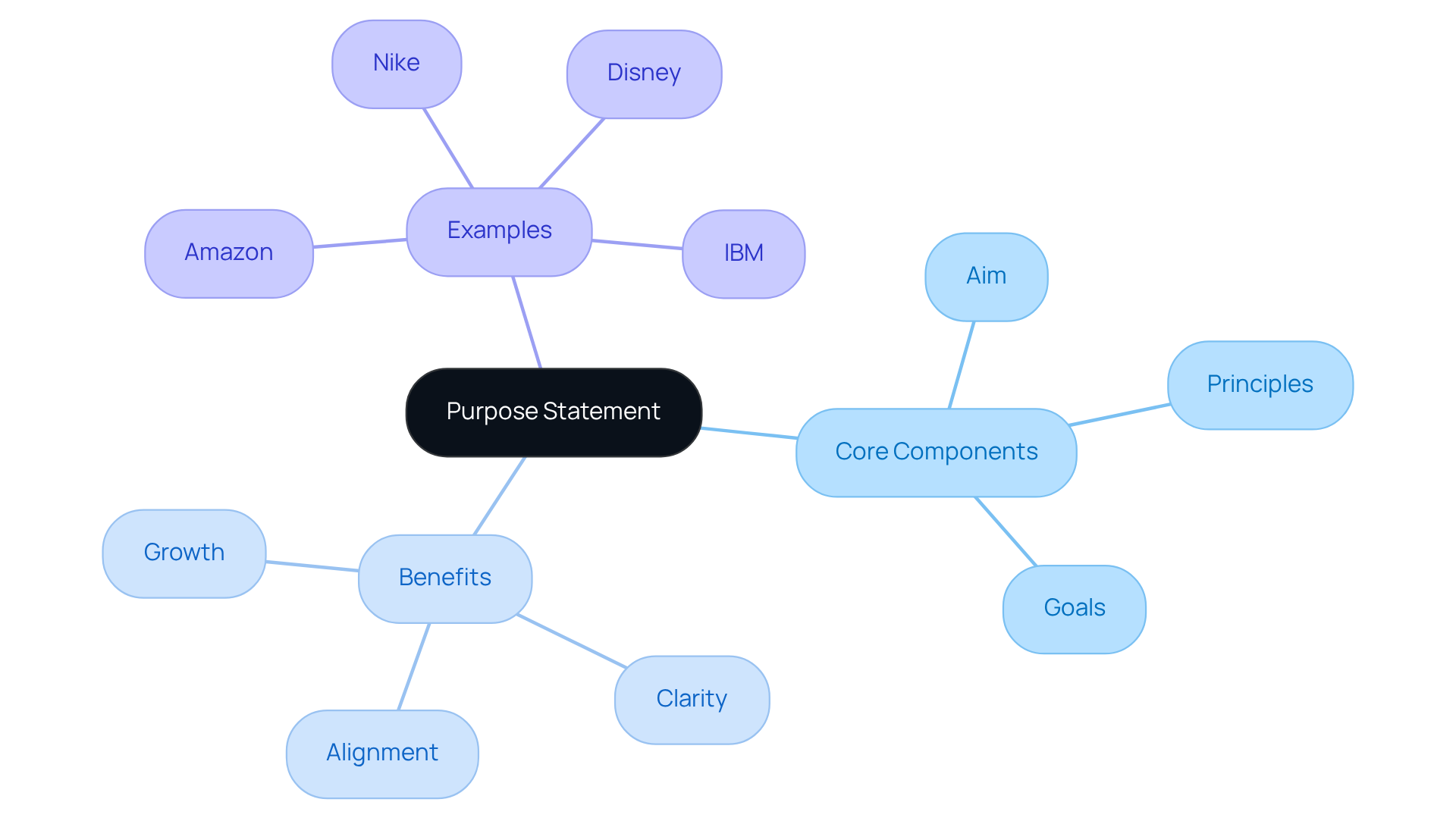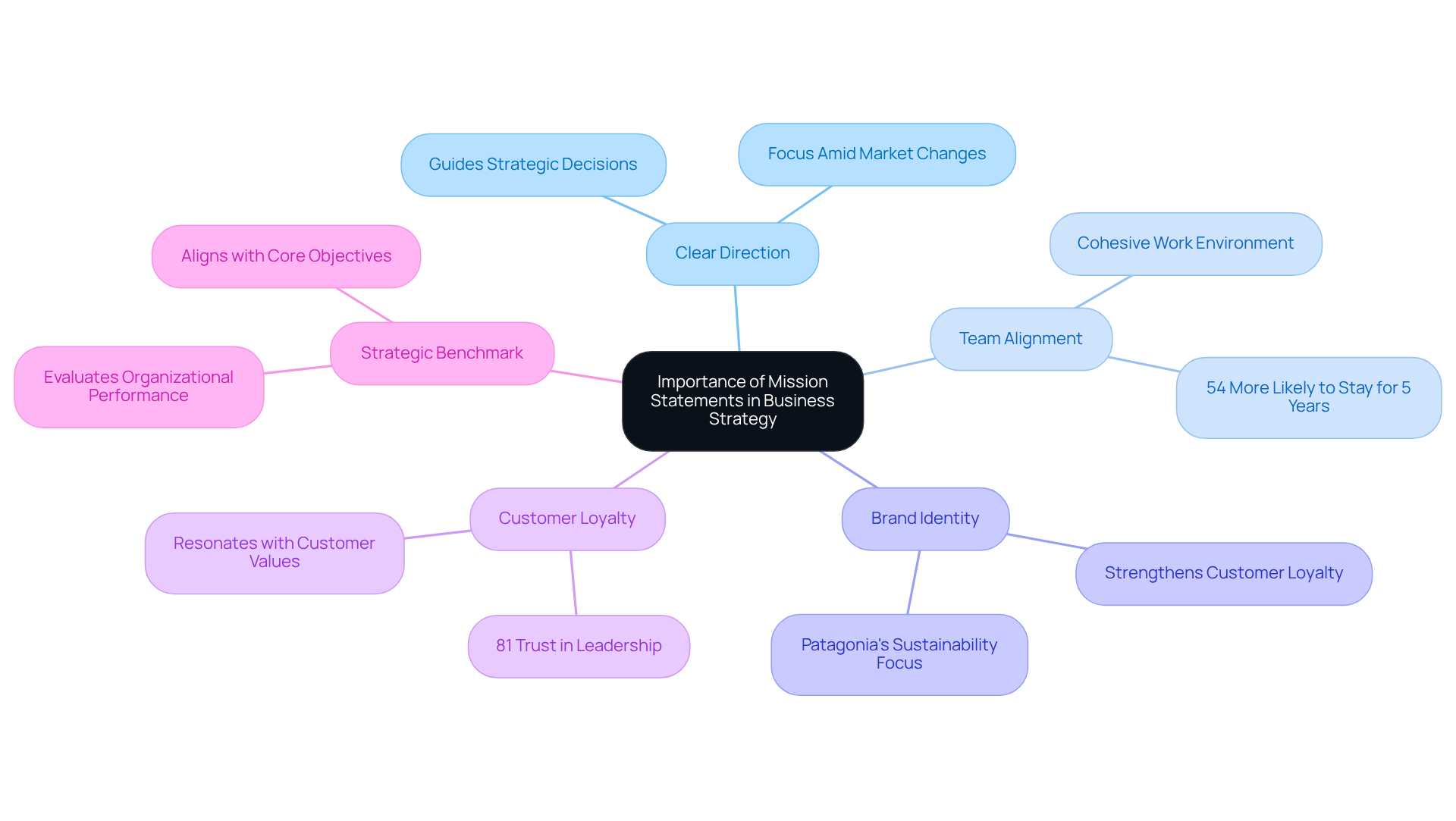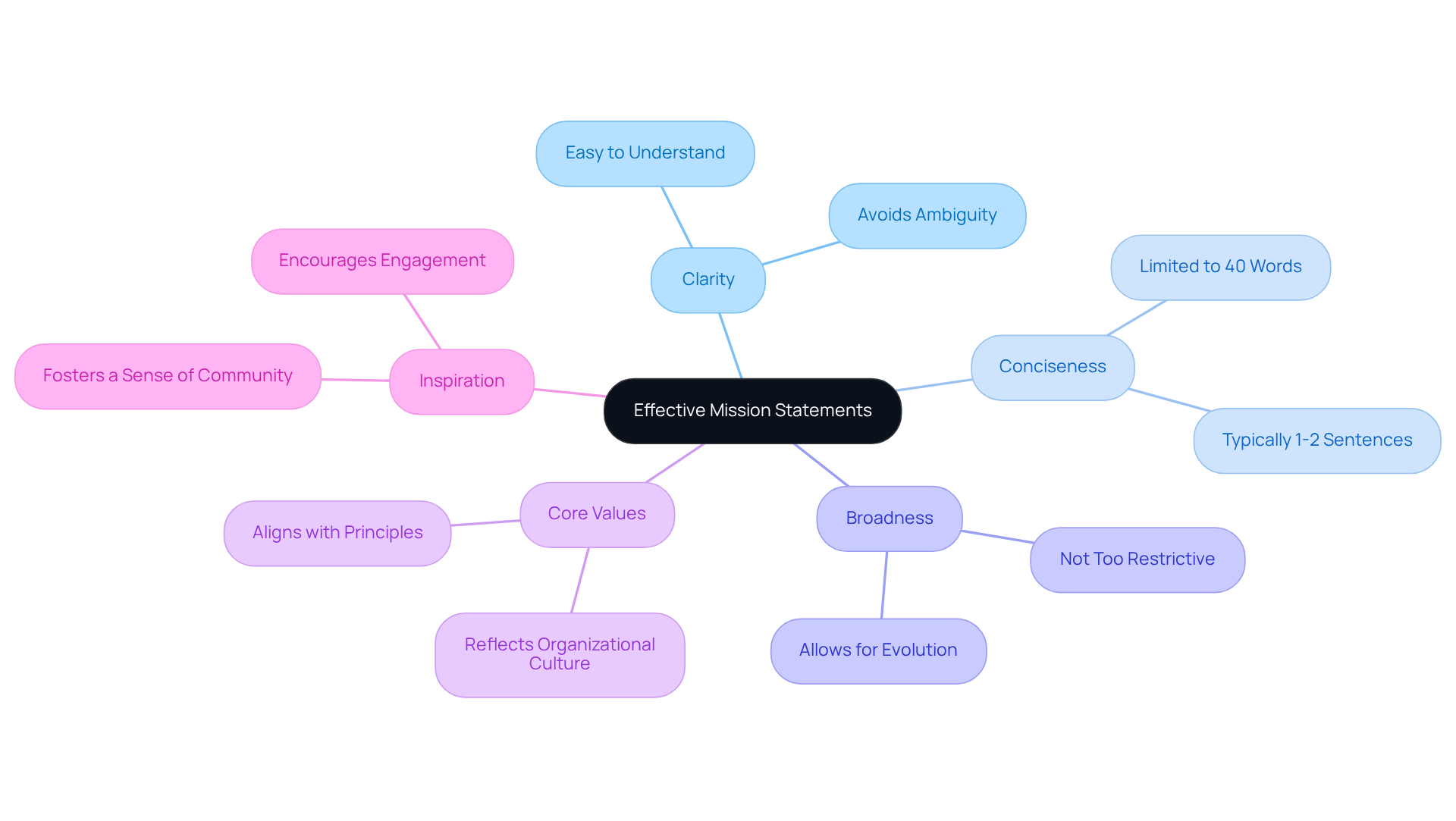Overview
In the fast-paced world of startups, many founders grapple with the challenge of establishing a clear direction. This uncertainty can lead to misalignment within teams and a disconnect with customers, ultimately affecting growth and sustainability. Without a well-defined purpose, the journey can feel overwhelming and isolating.
However, there is hope. Crafting a meaningful mission statement can serve as a guiding light, helping to clarify your company's purpose and foster alignment among your team. Companies like Tesla and Patagonia have shown us the power of a well-articulated mission, which not only resonates with their audiences but also cultivates loyalty and engagement. By clearly communicating your values and strategic direction, you invite your team and customers to share in your vision.
Imagine the difference it could make for your startup. A strong mission statement can enhance brand identity and create a sense of belonging, encouraging everyone involved to rally around a common goal. As you embark on this journey, remember that you are not alone; many have walked this path and found success through clarity and purpose. Let us support you in crafting a mission that truly reflects your vision and inspires those around you.
Introduction
Understanding the mission statements of companies presents a significant challenge for many startup founders. Crafting a compelling declaration can feel daunting, especially in a marketplace that often seems overcrowded. These succinct statements are not just words; they encapsulate an organization’s core purpose and act as a guiding compass for strategic decision-making and employee engagement.
Yet, how can startups create mission statements that truly resonate with their audience? This article explores the essential components of impactful mission statements, their vital role in shaping business strategy, and shares inspiring examples from notable companies. By doing so, we aim to provide invaluable insights for entrepreneurs seeking to define their purpose and drive success in a nurturing and supportive manner.
Define Mission Statements: Core Concepts and Purpose
A purpose declaration is more than just a statement; it’s a brief assertion that clarifies an entity's aim, fundamental principles, and main goals. For many tech startup founders, the challenge lies in articulating this purpose clearly. Without it, decision-making can feel overwhelming, and strategic planning may lack direction. This uncertainty can create anxiety among stakeholders, making it difficult to align efforts toward a unified goal.
Imagine the relief of having a concise purpose statement—summarized in just one or two sentences—that emphasizes what your entity does, whom it serves, and how it provides value. For instance, a tech startup might express its purpose as 'To empower small businesses through innovative software solutions that enhance productivity and growth.' This clarity not only educates your team and stakeholders but also effectively conveys your intent to clients and the wider market.
Studies show that over 90% of companies with clearly articulated purposes experience growth and profits that meet or exceed industry norms. This highlights the significance of having a clear objective in fostering employee involvement and organizational achievement. Consider firms like Amazon and Nike; their purpose declarations resonate deeply with their audiences and align closely with their business strategies, fostering a strong sense of purpose and direction.
As you reflect on your own startup's journey, think about how a well-defined purpose can serve as a guiding light. It nurtures a sense of belonging and direction, empowering you and your team to navigate the challenges ahead with confidence. Together, let’s explore how you can craft a purpose statement that not only resonates with your audience but also propels your startup toward success.

Explain the Importance of Mission Statements in Business Strategy
The mission statements of companies are crucial in shaping the journey of organizations, particularly for purpose-driven brands like those supported by RNO1. They offer a clear direction, ensuring that every team member is aligned with the company's goals and objectives. This alignment nurtures a cohesive work environment, where collaboration thrives toward shared outcomes. A thoughtfully crafted purpose declaration, akin to the mission statements of companies, not only enhances brand identity but also strengthens customer loyalty by articulating the organization's values and aspirations. For instance, Patagonia's purpose emphasizes environmental sustainability, connecting deeply with customers who prioritize eco-friendly practices and cultivating a loyal following.
Moreover, mission statements of companies serve as a vital benchmark for evaluating strategic decisions, especially concerning RNO1's offerings like Brand Strategy & Experience and Identity Design. They help organizations stay focused on their core objectives, particularly amid shifting market dynamics. Research indicates that firms with clear guiding principles experience improved staff performance and retention, with purpose-driven individuals being 54% more likely to remain for five years. This connection between purpose clarity and employee engagement underscores the importance of embedding mission statements of companies into the very fabric of organizational culture.
Case studies further illustrate the impact of purpose declarations on brand identity and customer loyalty. For example, organizations that actively champion their purpose witness a significant increase in trust among both employees and customers, with 81% of employees in purpose-driven companies expressing confidence in their leadership. This trust fosters greater customer engagement and loyalty, as consumers are more inclined to support brands that resonate with their values. Ultimately, a clear and accessible purpose declaration not only steers organizational direction but also cultivates a strong brand identity that connects with customers, paving the way for long-term success and supporting RNO1's mission of creating meaningful and profitable eCommerce experiences.

Identify Key Characteristics of Effective Mission Statements
Crafting a successful purpose declaration can often feel daunting for many organizations. The challenge lies in ensuring that these declarations are not only impactful but also resonate deeply with both employees and stakeholders. When purpose statements are clear and concise—typically limited to just a few sentences or around 40 words—they become memorable and easy to communicate. However, they must also be broad enough to allow for the natural evolution of the entity.
Imagine a purpose statement that inspires action and engagement. A powerful declaration does just that, encouraging everyone involved to connect with the organization’s vision. It should authentically reflect the core values and culture of the organization. Take Google’s purpose statement, for instance: To organize the world's information and make it universally accessible and useful. This statement not only encapsulates its aim but also fosters a sense of innovation and inclusivity.
Moreover, a robust purpose declaration serves as a guiding framework for strategic choices and operational methods. Research indicates that 36% of Fortune 500 companies explicitly reference 'customer' in their objectives, underscoring the importance of clarity and focus in expressing purpose. It’s vital to convey this purpose internally before sharing it externally, ensuring that everyone within the organization feels aligned and understands the vision.
As you reflect on your own organization’s purpose, consider how these traits can enhance your declaration. By nurturing a clear and inspiring purpose, you can foster a sense of community and direction that resonates with your team and stakeholders alike.

Provide Examples of Mission Statements from Notable Companies
In today's marketplace, many consumers seek more than just products; they yearn for brands that resonate with their values and aspirations. This desire for alignment can be challenging for companies striving to establish a meaningful connection with their audience. However, prominent companies have risen to this challenge by developing mission statements of companies that effectively convey their aims and principles, serving as a foundation for their branding and strategic direction.
For instance, Tesla's objective, 'To accelerate the world's transition to sustainable energy,' not only defines its business focus but also emphasizes its dedication to environmental sustainability. This commitment appeals to a growing consumer base that prioritizes eco-friendly practices, fostering a sense of shared purpose. Similarly, Nike's objective, 'To bring inspiration and innovation to every athlete in the world,' highlights inclusivity and motivation, resonating with a diverse audience and nurturing brand loyalty.
Warby Parker exemplifies a socially responsible approach with its goal 'To offer designer eyewear at a revolutionary price, while leading the way for socially conscious businesses.' This declaration reflects a commitment to affordability and social responsibility, aligning with consumer expectations for ethical practices. It's heartening to note that studies show 76% of Gen Z buyers favor shopping with companies that have a larger purpose, underscoring the growing need for purpose-oriented brands.
Furthermore, Patagonia's objective to protect the planet through intelligent business practices further demonstrates the trend of sustainability in purpose declarations. It's inspiring that 57% of consumers are willing to pay more for eco-friendly products, reflecting a collective commitment to a better future.
These examples illustrate how mission statements of companies embody a company's ethos and propel strategic initiatives, ultimately affecting consumer perception and involvement. Brands that articulate their values through clear and compelling mission statements of companies are more likely to resonate with consumers, fostering loyalty and advocacy in an increasingly competitive marketplace. By embracing this approach, companies can not only meet consumer expectations but also contribute positively to the world around them, creating a community of shared values and support.
![]()
Conclusion
Crafting a clear and impactful mission statement is essential for startups who often find themselves navigating the complexities of the business landscape. This concise declaration not only articulates the organization's purpose and core values but also serves as a guiding compass for decision-making and strategic planning. By establishing a well-defined mission, startups can foster alignment among team members and create a strong identity that resonates with customers and stakeholders alike.
Throughout this article, we have underscored the significance of mission statements through various insights. Organizations with clearly articulated purposes are more likely to experience growth, employee engagement, and customer loyalty. Consider the case studies of notable companies like Tesla, Nike, and Patagonia; they exemplify how effective mission statements can connect deeply with target audiences, drive brand loyalty, and support strategic initiatives. The characteristics of a successful mission statement—clarity, inspiration, and alignment with core values—are crucial for fostering an engaged and purpose-driven organizational culture.
Ultimately, the journey of crafting a mission statement is not just an exercise in branding but a vital step toward building a meaningful and sustainable business. We encourage startups to reflect on their unique values and aspirations, creating a mission that inspires both employees and customers. By embracing the power of a well-defined purpose, companies can not only differentiate themselves in a competitive marketplace but also contribute positively to society, paving the way for long-term success and meaningful impact.
Frequently Asked Questions
What is a purpose declaration?
A purpose declaration is a brief assertion that clarifies an entity's aim, fundamental principles, and main goals.
Why is it important for tech startup founders to articulate their purpose clearly?
Articulating purpose clearly helps in decision-making, provides direction for strategic planning, and reduces anxiety among stakeholders by aligning efforts toward a unified goal.
How can a concise purpose statement benefit a startup?
A concise purpose statement emphasizes what the entity does, whom it serves, and how it provides value, which educates the team and stakeholders and effectively conveys intent to clients and the market.
What is an example of a purpose statement for a tech startup?
An example of a purpose statement is "To empower small businesses through innovative software solutions that enhance productivity and growth."
What impact does having a clearly articulated purpose have on companies?
Studies show that over 90% of companies with clearly articulated purposes experience growth and profits that meet or exceed industry norms.
Can you provide examples of companies with effective purpose declarations?
Companies like Amazon and Nike have purpose declarations that resonate deeply with their audiences and align closely with their business strategies, fostering a strong sense of purpose and direction.
How does a well-defined purpose serve a startup?
A well-defined purpose serves as a guiding light, nurturing a sense of belonging and direction, and empowering the team to navigate challenges with confidence.




